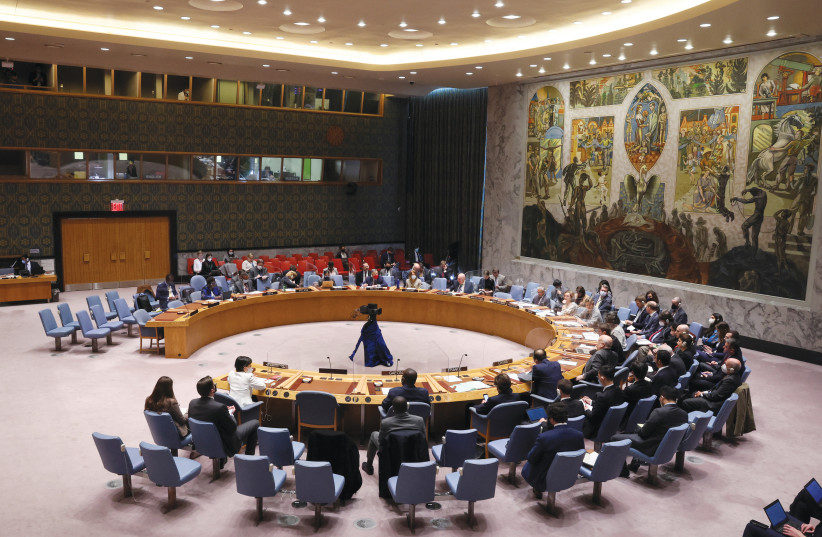The US disapproves of Jordan’s plan to normalize relations with Syria, US Ambassador to Jordan Henry Wooster said on Sunday in an interview with a Jordanian newspaper.
For more stories from The Media Line go to themedialine.org
In the interview with Al Ra’i, Jordan’s leading pro-government daily, Wooster praised Jordan for its modernization process while making clear that Washington is not in favor of the current Jordanian-led plan to rehabilitate Syrian President Bashar Assad.
“When it comes to the return of normal relations with the Syrian regime, the United States of America doesn’t support normalization with the Assad regime and doesn’t see it taking place soon,” the usually tight-lipped American diplomat said.
Wooster explained that the conditions of United Nations Security Council Resolution 2254, which demands an immediate cease-fire against civilian targets in Syria, have not yet been met. The 2015 resolution was passed unanimously by the 15 members of the UN Security Council.

Jordan’s plan for strengthening ties with Syria calls for reciprocity from Damascus for every step of improved relations. The Assad administration has yet to respond to the specific plan.
Jordan's requirements for normalizing relations with Syria
Former Jordanian government spokesperson Mohammad Momani told The Media Line that Jordan has a clear set of requirements for normalizing relations with Syria.
“There is a willingness to talk and to find positive steps that the Syrian government needs to take in regard to the refugee crisis, among them a need for a general amnesty,” Momani said. “Effort must be exerted to ensure that the militias don’t threaten regional security, as well as the need to challenge efforts from Syria to smuggle
drugs and weapons.”
According to the Washington-based Middle East news site Al-Monitor, a group of former US officials, including Marine General Kenneth “Frank” McKenzie Jr. and former Syria envoy James Jeffrey, has been urging the Biden administration “to counter the region’s rapprochement with Syria.”
Oraib Rantawi, director of the Al Quds Center for Political Studies in Amman, told The Media Line that the US is more interested in the wider geopolitical implications of Syria’s rehabilitation than it is in the future of Syria itself.
“The Americans do not care much about Assad; they are interested in weakening the Russians and Iranians,” he said. “The Americans feel that Iran and Russia, who are under international sanctions, are vulnerable when it comes to money.”
Jordan is far from the only country in the region facing the question of what to do about
relations with Syria.
Rantawi noted that Turkey may be moving toward warmer relations with Syria as well, in a process similarly colored by political interests and alliances. “The Russians are pressing Assad to talk to [Turkish President Recep Tayyip] Erdoğan
and to help him win the upcoming elections, while Asaad prefers the [Turkish] opposition who have never broken off contacts with Damascus,” Rantawi said.
Diplomatic relations between Turkey and Syria ended after the start of the Syrian Civil War in 2012.
Jordan’s King Abdullah II met briefly with Bahraini King Hamad bin Isa Al Khalifa and Bahraini Prime Minister Salman bin Hamad Al Khalifa on a state visit to Bahrain on Saturday, and observers say that the leaders discussed the issue of relations with Syria. Syria and Saudi Arabia have recently begun rebuilding diplomatic ties, although the
relationship between the two countries remains complex. Saudi Arabia is hoping to end the export of drugs from Syria to Saudi Arabia. The massive influx of amphetamine-like pills, known as Captagon, has rocked Saudi society. Export of the pills seems to be a major source of income for Iranian militias in Syria, though, who are unlikely to give up
their revenue source.
Saudi Arabia is hosting an Arab League summit in May, and questions remain aboutwhether a representative from Syria will be invited.
The Arab League, which aims to promote cooperation in the Arab world, currently has 22 member countries. Syria’s membership has been suspended since 2011 following Syrian government violence against civilians.
According to Rantawi, it is unlikely that Assad himself will be invited to the Arab League summit, but the foreign minister or another lower-level Syrian official may be invited as an observer.
Jordanian political scientist Tagreed Odeh, on the other hand, told The Media Line that
he anticipates Syria’s reentry into the Arab League, based on recent initiatives from
various Arab countries.
“The question that needs to be answered is whether the discussions with Syria will be
similar or different than what has been discussed in previous years,” Odeh said. “Also, it
is not clear whether we will see unanimity or a majority of support for the return of the
Syrians to the Arab League.”
